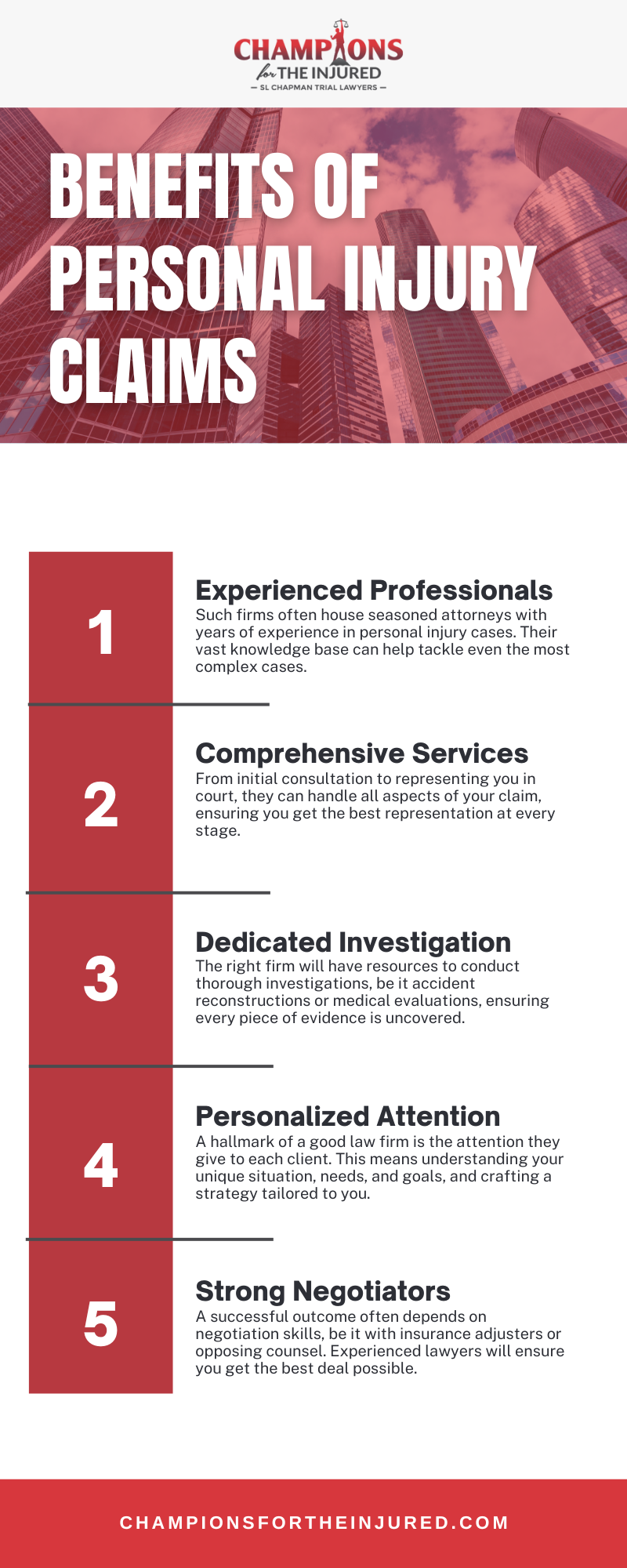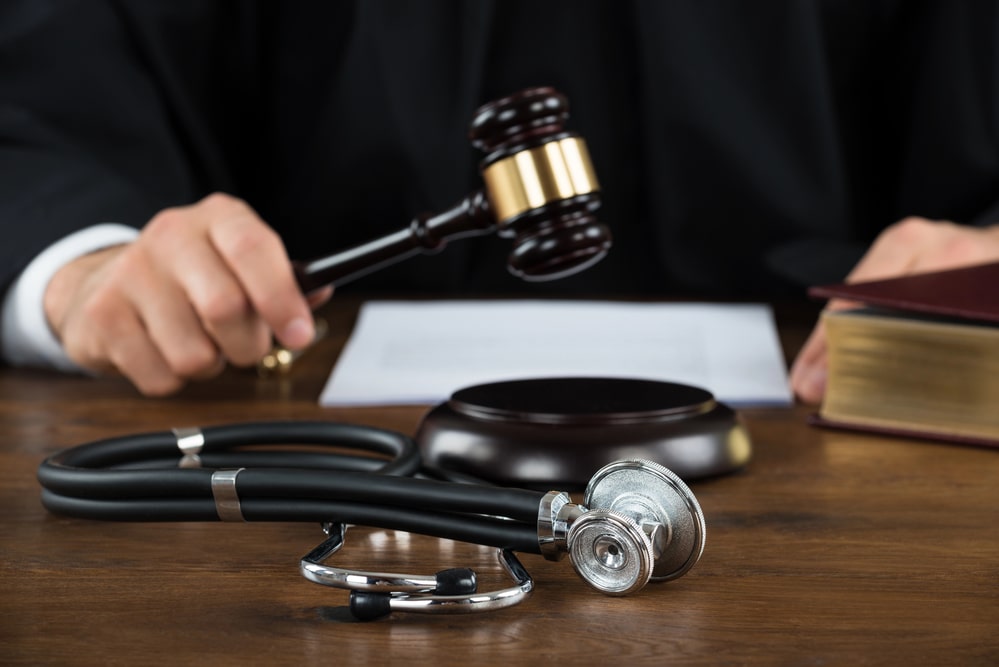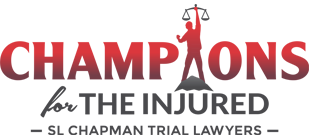
Scottsdale Personal Injury Lawyer
Pursuing Justice For Personal Injury Victims
Our Scottsdale, AZ personal injury lawyer is committed to assisting those who have suffered due to others’ negligence. We’ve handled a broad spectrum of personal injury cases, ranging from vehicular accidents to workplace injuries and medical malpractice. We strive to provide our clients with compassionate, comprehensive legal support. We’ve recovered over $1.6 billion in verdicts and settlements for injury clients over the years, and we’re ready to seek the compensation you deserve. If you’ve been the victim of an accident caused by someone else’s negligence, contact SL Chapman Trial Lawyers today. We look forward to hearing your story during a free and confidential consultation.
Table of Contents
How Our Personal Injury Lawyer Can Help You
At SL Chapman Lawyers, we can provide multiple benefits to anyone seeking assistance with personal injury claims:
- Experienced Professionals: We have years of experience in personal injury cases. Our vast knowledge base can help tackle even the most complex cases.
- Comprehensive Services: From initial consultation to representing you in court, we can handle all aspects of your claim.
- Dedicated Investigation: The right firm will have resources to conduct thorough investigations, be it accident reconstructions or medical evaluations.
- Personalized Attention: A hallmark of a good law firm is the attention they give to each client. This means understanding your unique situation, needs, and goals, and crafting a strategy tailored to you.
- Strong Negotiators: A successful outcome often depends on negotiation skills, be it with insurance adjusters or opposing counsel. Our experienced lawyers will pursue the best possible outcome.
Compensation For Personal Injury Victims
When it comes to navigating the aftermath of a personal injury, understanding the nuances of compensation is crucial. Whether it’s due to an accident at work, a car crash, or any other form of injury caused by someone else’s negligence, the path to obtaining fair compensation can be complex. This is where legal representation becomes invaluable. With our guidance, victims can understand their rights and the compensation they are entitled to.
Maximizing Your Compensation
Maximizing compensation is a key aspect of what we do. This involves a thorough assessment of the impact of the injury on our client’s life. It’s not just about the immediate medical costs; it’s about understanding the long-term consequences of the injury on their quality of life, ability to work, and emotional well-being. We strive to ensure that all these factors are considered when seeking compensation.
What To Do If Your Claim Gets Denied
When you’ve been involved in an accident or suffered an injury due to someone else’s negligence, it can be disheartening to have your claim denied. Our experienced Arizona personal injury lawyer understands the frustration and confusion that can arise from such a situation. Denials can occur for various reasons, and understanding these reasons is the first step in determining the best course of action.
Several factors can lead to the denial of a personal injury claim. These might include:
- Insufficient Evidence: If there is not enough evidence to prove negligence or liability, a claim may be denied.
- Disputes Over Liability: The other party may contest their responsibility for the accident, leading to a denial.
- Statute Of Limitations: If a claim is not filed within the legally specified time frame, it may be denied.
- Policy Exclusions: Sometimes, insurance policies have specific exclusions that may lead to denial of a claim.
After your claim is denied, it’s important not to lose hope. There are steps we can take to reassess and potentially revive your claim:
Reevaluate Your Claim
- Review The Denial: We start by thoroughly reviewing the reason for the denial. Understanding why your claim was denied is crucial in planning the next steps.
- Gather Additional Evidence: If the denial was due to insufficient evidence, we work to gather more comprehensive evidence to support your claim.
- Consult Experts: In some cases, consulting with experts, such as medical professionals or accident reconstruction specialists, can provide additional insight and strengthen your claim.
Legal Recourse
- Appeal The Decision: If there are grounds for an appeal, we can guide you through the process of challenging the denial.
- Negotiate With Insurance Companies: We can engage in further negotiations with the insurance company to seek a favorable outcome.
- Consider Litigation: If necessary, we are prepared to take your claim to court to fight for your rights and seek the compensation you deserve.
Steps To Take After An Accident
Experiencing an accident can be overwhelming and disorienting. At SL Chapman, we guide our clients through the crucial steps to take immediately after an accident:
- Ensure Safety: First and foremost, assess your safety and that of others involved. Move to a safe area if possible.
- Seek Medical Attention: Even if injuries seem minor, it’s essential to get medical help. Some injuries may not be immediately apparent.
- Report The Accident: Contact law enforcement to report the accident. A police report is a vital document for legal purposes.
- Exchange Information: Collect names, contact information, and insurance details from all parties involved.
- Document The Scene: Take photographs of the accident scene, including vehicle positions, damages, and any relevant road conditions or signage.
- Collect Witness Information: If there are any witnesses, gather their contact information as they can provide valuable statements later.
Managing Health And Legal Concerns
After addressing immediate concerns, the focus shifts to managing health and potential legal issues. Here’s what we recommend:
- Follow Up on Medical Care: Adhere to the treatment plan prescribed by healthcare professionals. Keep records of all medical visits, treatments, and expenses.
- Track Lost Wages: Document any work and wages lost due to the accident.
- Refrain from Immediate Settlements: Be cautious of early settlement offers from insurance companies. These offers may not fully cover your long-term needs and losses.
- Keep Records: Maintain a file of all accident-related documents, including medical bills, police reports, and correspondence with insurance companies.
Legal Considerations And Seeking Representation
In the wake of an accident, legal considerations become increasingly important. Here’s how our Scottsdale firm can assist:
- Legal Consultation: We advise seeking a legal consultation to understand your rights and options. This step is critical, especially if the accident resulted from someone else’s negligence.
- Understanding Your Claim: We help in assessing the strength of your claim, considering factors like liability and damages.
- Representation in Negotiations: Our team negotiates with insurance companies on your behalf to ensure fair compensation.
- Legal Action if Necessary: If a satisfactory settlement cannot be reached, we are prepared to represent you in court.
Common Types Of Personal Injury Cases
We understand that personal injury cases form a crucial part of our legal practice, frequently necessitating the skills of a specialized attorney. In Scottsdale, Arizona, individuals in need of legal representation for such cases frequently turn to us at SL Chapman, we are renowned for our expertise in this area of practice.
- Vehicle Accidents
Vehicle accidents are among the most common personal injury claims. These accidents can involve cars, trucks, motorcycles, bicycles, and pedestrians. The injuries resulting from such accidents can range from minor bruises to severe, life-altering conditions. In cases of rideshare accidents, it’s crucial to understand the nuances of the law, as liability often hinges on the specifics of each case. As seasoned Scottsdale personal injury lawyers, we know how to help clients seek the compensation they deserve.
- Workplace Injuries
Workplace injuries are another common type of personal injury. These can occur in any work environment, from office buildings to construction sites. Workers’ compensation laws are designed to protect employees injured on the job, but navigating these claims can be complex. We at SL Chapman have extensive experience in handling workplace injury cases, helping our clients understand their rights and guiding them through the process of securing fair compensation.
- Slip And Fall Accidents
Slip and fall accidents, often occurring in public or private properties, can lead to serious injuries. Property owners have a legal obligation to ensure their premises are safe. When they fail to do so, and someone is injured as a result, a personal injury claim may arise. Our team at SL Chapman is skilled in proving negligence in such cases, helping clients to hold the responsible parties accountable.
- Medical Malpractice
Medical malpractice occurs when a healthcare professional, through a negligent act or omission, causes injury to a patient. These cases require a deep understanding of both legal and medical principles. Our lawyers at SL Chapman are proficient in these areas, providing clients with the expertise needed to navigate these challenging cases.
- Product Liability
Injuries resulting from defective or dangerous products fall under product liability law. Manufacturers, distributors, and retailers may all be held accountable if their products cause harm. These cases can involve anything from faulty medical devices to unsafe consumer products. Our legal team at SL Chapman is well-versed in product liability laws, ensuring our clients’ rights are protected.
- Other Personal Injury Types
Other common types of personal injury cases include dog bites, birth injuries, assault and battery, and wrongful death.
Scottsdale Personal Injury Infographic

Personal Injury Statistics
- 227,039 preventable deaths occurred in the United States in 2022. – National Safety Council
- Unintentional poisonings and falls were the top two causes of injury-related deaths for all age groups in 2022. – WISQARS Fatal and Nonfatal Injury Infographics
- There were 12 deaths attributed to railway accidents among Arizona residents in 2021, an increase from 9 such deaths in 2020. – Arizona Motor Vehicle Crash Facts | Department of Transportation
- Workplace-related falls in the United States cost an estimated $70 billion each year in workers’ compensation and medical expenses. – CDC
FAQs
What constitutes a personal injury claim?
A personal injury claim arises when an individual suffers harm from an accident or injury, and someone else might be legally responsible for that harm. This can include a wide range of situations such as car accidents, slip and fall incidents, medical malpractice, or injuries caused by defective products. The key element is proving that another party’s negligence or intentional act caused the injury.
How long do I have to file a personal injury lawsuit?
The time frame for filing a personal injury lawsuit is governed by a statute of limitations, which varies by state. Typically, you have a limited period from the date of the injury to file a lawsuit. Arizona’s statute of limitations is two years, but certain exceptions may apply to your case. It’s crucial to consult with a personal injury lawyer to understand the specific time limits applicable in your case.
Can I still file a claim if I was partially at fault for my injury?
Yes, you can still file a personal injury claim even if you were partially at fault. Most states follow a comparative negligence rule, which allows you to seek compensation even if you are partly to blame for the incident. However, your compensation may be reduced by a percentage equal to your degree of fault.
What types of compensation can I receive in a personal injury case?
In a personal injury case, you may be entitled to various types of compensation, including medical expenses, lost wages, pain and suffering, and emotional distress. In some cases, if the defendant’s conduct was especially egregious, punitive damages may also be awarded. The specific types of compensation depend on the details of the case and the extent of your injuries.
Do I need a lawyer to file a personal injury claim?
While it’s not mandatory to have a lawyer to file a personal injury claim, it is highly advisable. Personal injury law can be complex, and a skilled lawyer can help navigate the legal system, negotiate with insurance companies, and ensure that you receive fair compensation. An experienced personal injury lawyer will understand how to build a strong case and advocate effectively on your behalf.

Personal Injury Glossary
When working with a Scottsdale, AZ personal injury lawyer, it’s helpful to understand common legal terms that may arise during your case. Below, we’ve defined several key phrases that often appear in litigation and civil matters related to personal injury claims. These terms are used regularly in court filings, negotiations, and legal discussions, and having a working knowledge of them can help make the legal process clearer.
Arbitration
Arbitration is a type of dispute resolution used to settle civil matters outside of the courtroom. It is a more structured process than mediation and often resembles a simplified trial. Both parties present their arguments and evidence to a neutral third party known as an arbitrator. The arbitrator then makes a decision based on the facts and legal principles involved. In some cases, arbitration may be legally binding, which means the decision is final and enforceable in court. In others, it may be non-binding, allowing either party to reject the outcome and proceed to litigation if necessary.
For personal injury clients, arbitration may be proposed when negotiating with insurance companies or other parties seeking to avoid trial. It’s typically faster and less formal than courtroom litigation, but the result can still carry significant legal weight.
Appellate Advocacy
Appellate advocacy refers to the legal practice of handling appeals—cases where a party is seeking to change the outcome of a previous court decision. This happens after a trial court has made a ruling, and one side believes a legal error affected the outcome. Lawyers involved in appellate work are not retrying the case but are instead arguing that a legal mistake occurred in the lower court’s handling of the law, procedure, or admissibility of evidence.
For example, if a personal injury lawsuit in Scottsdale results in a judgment the client believes is unfair due to a misapplied legal standard, the attorney may recommend filing an appeal. Appellate advocacy requires strong legal writing skills and a focus on legal precedent and statutory interpretation.
Mediation
Mediation is another form of alternative dispute resolution often used before a case reaches trial. Unlike arbitration, mediation is non-binding, and the mediator does not issue a decision. Instead, the mediator helps the parties communicate and come to a mutual agreement. The goal is to resolve the conflict in a way that satisfies both sides without court involvement.
Personal injury lawyers may use mediation to negotiate settlements with opposing counsel or insurance representatives. This method is particularly helpful when both sides are open to compromise but need assistance resolving specific disagreements. Mediation sessions are confidential and often result in faster resolutions with less expense than going to trial.
Deposition
A deposition is a sworn, out-of-court statement given by a witness or party involved in a lawsuit. It is part of the discovery process, where each side gathers information before trial. Attorneys from both sides are present, and the person being deposed must answer questions under oath. A court reporter records the testimony, which can later be used as evidence or for reference during trial.
In a personal injury case, depositions can be used to understand the sequence of events, assess the credibility of witnesses, and evaluate the strength of each party’s arguments. Depositions are a critical part of building a legal strategy and often influence decisions about settlement or proceeding to trial.
Settlement Conference
A settlement conference is a scheduled meeting where the parties in a case, along with their lawyers, attempt to resolve the dispute before trial. Sometimes these conferences are informal and held between attorneys. Other times, they are court-ordered and overseen by a judge or magistrate. The purpose is to encourage settlement by reviewing the facts and discussing possible outcomes.
For individuals pursuing personal injury claims, a settlement conference may be the best opportunity to receive compensation without enduring a full trial. The judge may offer input on the strength of each side’s case and help guide both parties toward a resolution. While a settlement is not guaranteed, these conferences often lead to productive negotiations.
If you are facing legal issues due to an injury, working with a qualified litigation attorney can help you pursue compensation effectively. At SL Chapman Trial Lawyers, we’re committed to guiding clients in Scottsdale, AZ through the legal process with professionalism and transparency.
Reach out to us today to schedule a free consultation and talk about your case. We’re here to answer your questions and provide honest feedback about your legal options.
SL Chapman Trial Lawyers, Scottsdale Personal Injury Lawyer
7135 E Camelback Rd #230, Scottsdale, AZ 85251
AARP
Contact Our Firm Today
Our journey as personal injury lawyers at SL Chapman has been deeply rooted in a commitment to justice and client well-being. We understand the profound impact personal injuries can have on individuals and families, and we dedicate ourselves to navigating these complex cases with expertise, compassion, and unwavering support. Our aim is not just to serve as legal representatives, but as steadfast advocates for those affected by personal injuries in Scottsdale. At SL Chapman, we stand as more than just lawyers; we are allies in our clients’ paths to recovery and resolution. Contact us today to learn more about our services and how we can help you seek justice.


